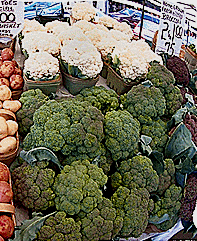Broccoli, Cauliflower,
and Cancer!
See
recipe below for
Cheesy Broccoli and Cauliflower Casserole
 Did
you eat your broccoli today? If you did, then you've done a little
to help protect yourself against colon cancer! Did
you eat your broccoli today? If you did, then you've done a little
to help protect yourself against colon cancer!
Broccoli, along
with cauliflower, cabbage, brussels sprouts, rutabagas, onions,
and turnips are in a family called cruciferous vegetables. These vegetables contain isothiocyanate, one of many phytochemicals that have been found
to offer protection against certain carcinogens. Other vegetables
containing isothiocyanate are kale, mustard greens, collards,
and kohlrabi.
Does what
you eat actually affect your risk of cancer? Absolutely! The American
Cancer Society says from 35% to 50% of all cancers are nutritionally
linked! (Heavy smoking and alcohol consumption increase your
risk even more.)
Some recommendations:
- Eat five or
more servings of fresh fruit and vegetables every day.
- Limit meat intake.
Choose beans, peanuts, tofu, and soy-based meat substitutes instead.
- Choose lean
cuts of meat, broiled or baked rather than fried or sauteed.
Trim the fat and discard before cooking. Limit to 3 oz. servings.
- Choose fresh
meat instead of smoked or cured meat, like bologna, sausage,
and hotdogs. Nitrites from the curing process form carcinogens
in the body.
- Choose chicken,
fish, and seafood instead of red meat. Remove the skin from chicken.
- Limit intake
of high fat foods. Choose foods baked or broiled instead of fried.
- Choose whole
grain over processed products, such as whole wheat rather than
white bread, to increase fiber in your diet.
- Limit alcoholic
beverages.
For more information
on cancer, call the Cancer Information Service of the National
Cancer Institute at 800-422-6237 or visit their web site at cancernet.nci.nih.gov.
Here's a recipe
you'll be anxious to try!
 Award Award
Winning
Recipe
from
Barbara's Kitchen
Cheesy
Broccoli
and Cauliflower Casserole
Ingredients:
- 1 ten oz. can
of Cheddar Cheese soup mix
- 4 to 5 cups
fresh Broccoli and Cauliflower
- 1/4 cup freshly
chopped Onion
- 1 Tbsp. freshly
chopped Garlic
- Paprika (optional)
Directions:
Prepare in a
shallow 8" x 8" baking dish, canned Cheddar Cheese
soup mix - (prepare per directions on product - for best results,
use more water and less milk of the total liquid allowed - add
less liquid for a thicker sauce. Soy milk can be used in place
of regular milk.)
Wash and cut
fresh broccoli and cauliflower into large 3-inch pieces and add
to soup preparation. (Optional: add rutabagas or turnips for
extra flavor!)
Stove top
preparation:
Cook vegetables in cheese mixture over low heat. Cover just enough
to let the steam out. Don't boil. Turn gently while cooking.
Oven preparation:
Prepare
as for stove top. Cook on low heat until the cheese mixture has
melted turning the vegetables often. Loosely cover and cook in
the oven at 350 degrees for 30 minutes or until the desired softness
of the vegetables is reached (for crisper vegetables, cook less
time). During the last 15 minutes of cooking, remove from the
oven and stir the vegetables into the cheese sauce. Leave the
cover off and put the vegetables back into the oven for the remaining
cooking time to let the top brown.
For a cheesier
mixture, top with Velveeta or American cheese during the last
10 minutes of cooking. Sprinkle with Paprika and serve.
Where do you get your nutrition
information? Most states now have licensure laws for Dietitians
and Nutritionists. Be sure your nutrition advisor is "Licensed"
by the State as a Licensed Dietitian (LD) or Licensed Nutritionist
(LN), or in states that don't have licensure laws, a Registered
Dietitian.
CarboH,
Inc.
Barbara Herondorf, L.D.
Home |
FAQ's |
Sample Menu |
Policies
More About CarboH |
Order CarboH |
Contact Us |
Letters
|


